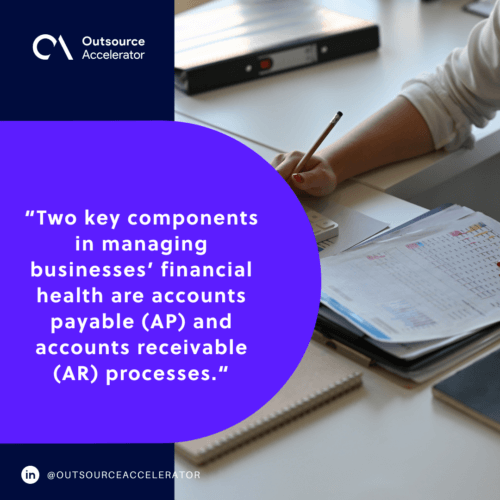Accounts payable vs. Accounts receivable: Important FAQs

Managing a business’s financial transactions effectively is crucial for maintaining cash flow, ensuring timely payments, and achieving long-term financial stability.
This involves overseeing both incoming and outgoing payments, tracking expenses, and managing invoicing processes.
Proper management of these transactions ensures a business can meet its financial obligations while maximizing profitability. Among the key elements in financial management are accounts payable (AP) and accounts receivable (AR).
In this blog, we’ll explore the key differences between accounts payable vs. accounts receivable.
We’ll also discuss how offshoring finance and accounting specialists can help growing businesses streamline these processes for greater efficiency and accuracy.
Accounts payable vs. Accounts receivable: Definition of terms
Two key components in managing businesses’ financial health are accounts payable (AP) and accounts receivable (AR) processes. While they both deal with money flowing in and out of the business, they serve opposite functions.

What is accounts payable?
Accounts payable (AP) refers to the money a business owes to its suppliers, vendors, or creditors for goods and services received. This includes outstanding bills, invoices, and short-term debts that the company must pay within a specified period.
Effective AP management ensures that the business meets its payment obligations on time. This helps maintain good relationships with suppliers and avoid late fees or penalties.
Proper handling of the accounts payable process also helps with budgeting and forecasting, as it allows businesses to track upcoming expenses.
What is accounts receivable?
Accounts receivable (AR), on the other hand, represents the money that a business is owed by its customers or clients for products or services provided on credit.
These outstanding payments are typically collected through invoices. Businesses need to monitor AR closely to ensure timely receipt of funds.
Efficient AR management helps maintain steady cash flow, reduce bad debt, and strengthen customer relationships through clear communication of payment terms and deadlines.
Proper AR management is essential for keeping a business financially healthy and ensuring it has the liquidity needed to meet operational needs.
Accounts payable vs. Accounts receivable: FAQs
To explain both concepts further, below we have the common FAQs between accounts payable vs. accounts receivable:
1. What are the typical payment terms for accounts payable?
Payment terms for accounts payable can vary depending on the agreement between the business and its suppliers.
Common terms include “Net 30,” which means payment is due within 30 days of receiving the invoice, or “2/10 Net 30,” offering a discount if paid within 10 days.
Understanding and adhering to these terms can help businesses avoid late fees and take advantage of potential discounts.
2. What happens if accounts payable is not managed properly?
Poor management of accounts payable can lead to missed payments, late fees, strained relationships with suppliers, and a damaged credit rating. It can also disrupt a company’s cash flow, making it harder to meet other financial obligations or invest in business growth.
Proper AP management is essential to keep a business financially stable.
3. How does accounts receivable impact cash flow?
Accounts receivable directly affect cash flow because it represents the money that is expected to come in. Delays in receiving payments can create cash flow problems, making it harder for the business to meet its own financial obligations.
Timely collection of AR is vital for maintaining healthy liquidity.
4. What should I do if a customer doesn’t pay their accounts receivable on time?
If a customer misses a payment, businesses should follow up with reminders, offer payment plans, or, in more serious cases, initiate collection procedures.
Maintaining regular communication and having clear payment terms can help reduce the likelihood of overdue accounts and improve overall AR management.

Offshoring accounts payable/receivable specialist
Offshoring accounts payable and receivable specialists with Booth and Partners is a smart solution for businesses looking to streamline their financial operations and improve efficiency.
Booth and Partners is a trusted outsourcing provider that helps you tap into a pool of skilled professionals who are equipped to handle AP and AR tasks accurately and on time.
Optimize your accounts payable and receivable processes. Visit Booth and Partners today and discover how offshoring can enhance your business’s financial performance!







 Independent
Independent




